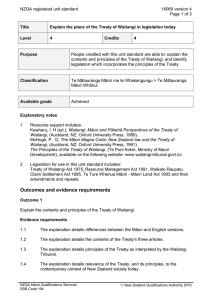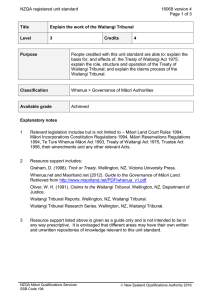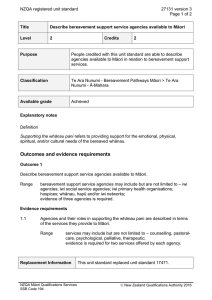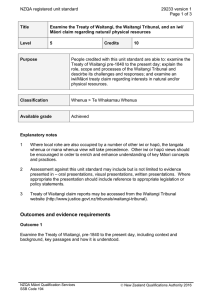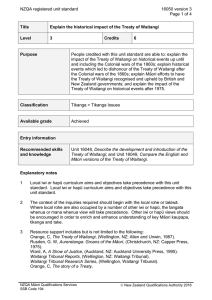NZQA registered unit standard 16049 version 3 Page 1 of 3
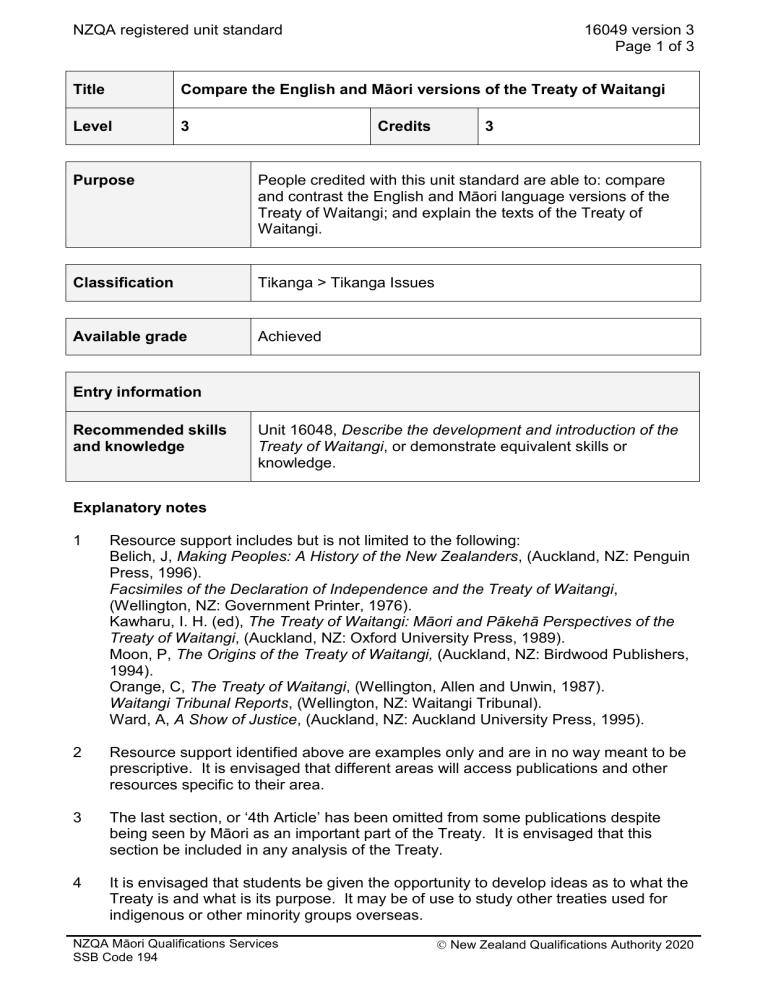
NZQA registered unit standard
Title
16049 version 3
Page 1 of 3
Compare the English and Māori versions of the Treaty of Waitangi
3 Credits 3 Level
Purpose People credited with this unit standard are able to: compare and contrast the English and Māori language versions of the
Treaty of Waitangi; and explain the texts of the Treaty of
Waitangi.
Classification
Available grade
Entry information
Tikanga > Tikanga Issues
Achieved
Recommended skills and knowledge
Unit 16048, Describe the development and introduction of the
Treaty of Waitangi , or demonstrate equivalent skills or knowledge.
Explanatory notes
1 Resource support includes but is not limited to the following:
Belich, J, Making Peoples: A History of the New Zealanders , (Auckland, NZ: Penguin
Press, 1996).
Facsimiles of the Declaration of Independence and the Treaty of Waitangi ,
(Wellington, NZ: Government Printer, 1976).
Kawharu, I. H. (ed), The Treaty of Waitangi: Māori and Pākehā Perspectives of the
Treaty of Waitangi , (Auckland, NZ: Oxford University Press, 1989).
Moon, P, The Origins of the Treaty of Waitangi, (Auckland, NZ: Birdwood Publishers,
1994).
Orange, C, The Treaty of Waitangi , (Wellington, Allen and Unwin, 1987).
Waitangi Tribunal Reports , (Wellington, NZ: Waitangi Tribunal).
Ward, A, A Show of Justice , (Auckland, NZ: Auckland University Press, 1995).
2 Resource support identified above are examples only and are in no way meant to be prescriptive. It is envisaged that different areas will access publications and other resources specific to their area.
3 The last section, or ‘4th Article’ has been omitted from some publications despite being seen by Māori as an important part of the Treaty. It is envisaged that this section be included in any analysis of the Treaty.
4 It is envisaged that students be given the opportunity to develop ideas as to what the
Treaty is and what is its purpose. It may be of use to study other treaties used for indigenous or other minority groups overseas.
NZQA Māori Qualifications Services
SSB Code 194
New Zealand Qualifications Authority 2020
NZQA registered unit standard 16049 version 3
Page 2 of 3
Outcomes and evidence requirements
Outcome 1
Compare and contrast the English and Māori language versions of the Treaty of Waitangi.
Evidence requirements
1.1 The explanation details the translation process followed to write the Māori version of the Treaty.
1.2 The explanation identifies key sections, phrases and words which have different meanings in each version.
1.3 The explanation compares the overall intent of the Treaty according to each version.
Outcome 2
Explain the texts of the Treaty of Waitangi.
Evidence requirements
2.1 The explanation details the preambles of the English and Māori language versions.
2.2 The explanation details the intent of Articles 1, 2 and 3 of the Treaty and the differences between the English and Māori language versions.
2.3 The explanation details the Fourth Article of the Treaty and its importance to
Māori.
Planned review date 31 December 2016
Status information and last date for assessment for superseded versions
Process Version Date Last Date for Assessment
Registration
Review
1
2
29 June 1999
19 December 2003
31 December 2015
31 December 2015
Rollover and
Revision
3 12 December 2013 N/A
Consent and Moderation Requirements (CMR) reference 0226
This CMR can be accessed at http://www.nzqa.govt.nz/framework/search/index.do
.
NZQA Māori Qualifications Services
SSB Code 194
New Zealand Qualifications Authority 2020
NZQA registered unit standard 16049 version 3
Page 3 of 3
Please note
Providers must be granted consent to assess against standards (accredited) by NZQA, before they can report credits from assessment against unit standards or deliver courses of study leading to that assessment.
Industry Training Organisations must be granted consent to assess against standards by
NZQA before they can register credits from assessment against unit standards.
Providers and Industry Training Organisations, which have been granted consent and which are assessing against unit standards must engage with the moderation system that applies to those standards.
Requirements for consent to assess and an outline of the moderation system that applies to this standard are outlined in the Consent and Moderation Requirements (CMR). The
CMR also includes useful information about special requirements for organisations wishing to develop education and training programmes, such as minimum qualifications for tutors and assessors, and special resource requirements.
Comments on this unit standard
Please contact the
NZQA Māori Qualifications Services mqs@nzqa.govt.nz
if you wish to suggest changes to the content of this unit standard.
NZQA Māori Qualifications Services
SSB Code 194
New Zealand Qualifications Authority 2020
